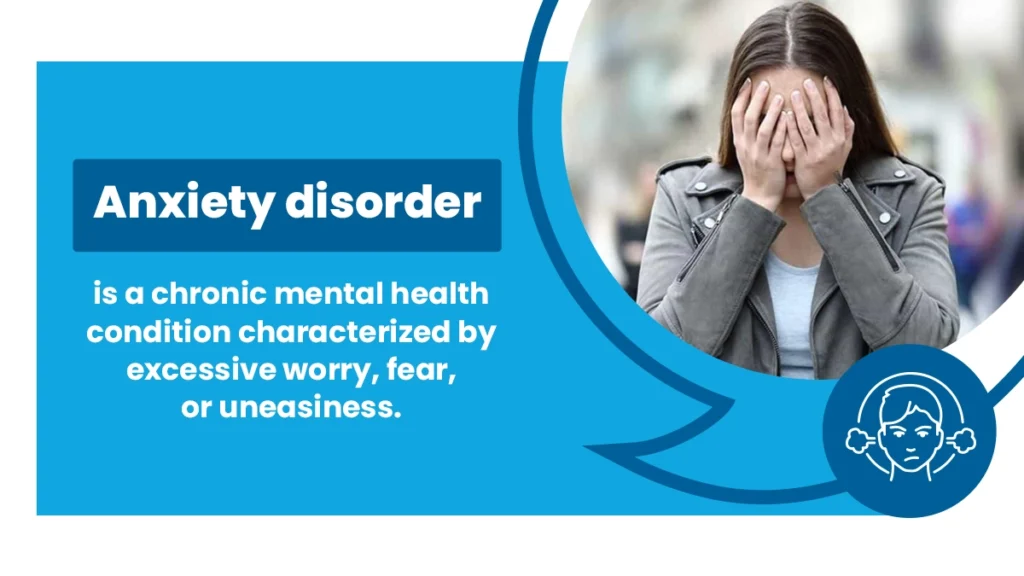Anxiety disorder is a widespread mental health condition categorized by persistent feelings of fear, worry, and unease that can significantly impact daily life. Individuals with anxiety disorders often experience excessive and uncontrollable apprehension about future events, leading to physical and emotional distress.
Understanding the nuanced nature of anxiety disorders is crucial for fostering empathy, reducing stigma, and promoting effective intervention strategies to enhance the well-being of those affected.
Key Takeaways
Anxiety disorders can vary in severity and may coexist with other mental health conditions, such as depression. Here’s what you need to know:
- Anxiety disorder is a chronic mental health condition characterized by excessive worry, fear, or uneasiness.
- It involves physical and psychological symptoms, ranging from restlessness to difficulty concentrating.
- Seeking professional help and adopting coping strategies are crucial for managing anxiety disorders effectively.
Contact The Haven Detox-New England at (844) 933-4145 for more information and mental health care for optimal well-being.

Introduction to Anxiety Disorder
An anxiety disorder is a mental health state marked by ongoing, extreme fear or worry that greatly affects daily life. It results in heightened emotional arousal, causing restlessness, tension, and irritability.
People with anxiety disorders often feel a looming sense of doom or fear of uncontrollable events, even without a visible threat. This heightened anxiety can disrupt regular activities and may show up physically with symptoms like a faster heart rate, sweating, and trouble concentrating.
Signs and Symptoms of Anxiety Disorders
The signs and indicators of anxiety can vary widely among individuals. Following are some common emotional and physical symptoms associated with anxiety disorders:
Emotional Symptoms
- Excessive Worry: Persistent and uncontrollable worrying about everyday situations or future events.
- Fear and Apprehension: Feeling a sense of impending doom or danger, even when there is no clear threat.
- Irritability: Easily becoming agitated, restless, or having a short temper.
- Difficulty Concentrating: Trouble focusing on tasks or making decisions due to racing thoughts.
- Sleep Disturbances: Insomnia, difficulty falling asleep, staying asleep, or experiencing restless sleep.
- Muscle Tension: Feeling tense, restless, or on edge, leading to physical discomfort.
Physical Symptoms
- Fatigue: Persistent tiredness and lack of energy, often unrelated to physical exertion.
- Rapid Heartbeat: Palpitations, increased heart rate, or a feeling of a racing heart.
- Shortness of Breath: Difficulty breathing or feeling unable to get enough air.
- Sweating: Excessive sweating, even when it’s not physically warranted.
- Trembling or Shaking: Uncontrolled trembling or shaking, especially in the hands.
- Dizziness or Lightheadedness: Feeling faint, dizzy, or unsteady.
- Nausea or Upset Stomach: Feeling queasy, having stomach cramps, or experiencing digestive issues.
- Headaches: Frequent headaches or migraines, often related to tension.
- Muscle Aches and Pains: Generalized muscle soreness or specific areas of tension.
Types of Anxiety Disorders
There are numerous types of anxiety disorders, each with its own set of indicators and diagnostic criteria. Here are some common types of anxiety disorders:
Generalized Anxiety Disorder (GAD)
Generalized anxiety disorder, commonly known as GAD, involves firm and excessive worry about various aspects of life, such as relationships, work, and health. People with GAD often find it challenging to control their worries and may experience physical symptoms like muscle tension and restlessness.
Panic Disorder
Panic disorder is marked by frequent and unpredicted panic attacks, which are intense periods of fear with physical symptoms like a racing heart, shortness of breath, and chest pain. People with panic disorder often live in fear of facing another attack, leading to behavioral changes as they try to avoid potential triggers.
Social Anxiety Disorder
Social anxiety disorder, also called social phobia, revolves around a rigorous fear of social situations and the fear of being judged or embarrassed. Older adults with social anxiety may avoid social interactions altogether, leading to isolation and a significant impact on their daily functioning.
Obsessive-Compulsive Disorder (OCD)
Obsessive-compulsive disorder involves recurring, unwanted thoughts (obsessions) and repetitive behaviors or mental acts (compulsions). These rituals are performed to alleviate anxiety associated with the obsessions.
OCD can pointedly interfere with daily life and may manifest in various forms, such as checking, washing, or counting rituals.
Post-Traumatic Stress Disorder (PTSD)
Post-traumatic stress disorder progresses after exposure to a traumatic event. Symptoms may include intrusive memories, nightmares, flashbacks, and severe emotional distress. Individuals with PTSD may experience heightened arousal and avoidance of reminders related to the traumatic incident.
Specific Phobias
An intense fear of a particular object or state categorizes specific phobias. Common phobias include fear of heights, flying, spiders, or enclosed spaces. People with specific phobias often go to great lengths to avoid the feared stimuli, leading to a significant impact on their daily lives.
Causes of Anxiety Disorders
Anxiety disorders are pervasive mental health conditions affecting millions globally. While each individual’s experience is unique, several common causes contribute to the development of these disorders, often manifesting in excessive worry, fear, and nervousness.
Genetic Factors
Anxiety disorders often have a hereditary component. Individuals with a family history of anxiety are more prone to developing these conditions. Genetic predispositions can influence brain chemistry and the regulation of stress responses, contributing to heightened anxiety levels.
Brain Chemistry Imbalance
Neurotransmitters like dopamine and serotonin play a central role in regulating mood and stress. Imbalances in these chemicals can lead to disruptions in the brain’s communication pathways, contributing to the development of anxiety disorders.
This chemical imbalance may result from genetic factors or environmental influences.
Environmental Stressors
Being exposed to ongoing stress, traumatic events, or tough life experiences can bring about anxiety disorders. These stressors may involve childhood trauma, abuse, or significant life changes like divorce or loss.
Environmental factors play a substantial role in influencing the development and worsening of anxiety symptoms.
Medical Conditions
Underlying medical conditions, such as thyroid disorders or chronic illnesses, can contribute to the onset of anxiety. Physical health and mental well-being are interrelated, and disruptions in bodily functions can impact the brain’s ability to manage stress and anxiety.
Substance Abuse
Substance abuse, including the misuse of drugs or alcohol, can exacerbate or trigger anxiety disorders. These substances may alter brain chemistry, intensifying feelings of anxiety. Additionally, individuals may use substances as a way to cope with existing anxiety, creating a harmful cycle.
Impact of Anxiety Disorders on Quality of Life
Anxiety disorders can significantly disrupt various aspects of an individual’s life, exerting profound effects on their overall well-being and daily functioning.
Personal Relationships
Anxiety disorders can strain personal relationships because people may find it challenging to communicate and regulate their emotions. Persistent worry and fear may cause social withdrawal, making it difficult to sustain healthy connections.
The strain on relationships often arises from difficulties expressing emotions and a fear of judgment.
Work and Academic Performance
Anxiety disorders can impede work and academic performance by affecting concentration, decision-making, and productivity. Individuals may struggle with meeting deadlines, participating in group activities, and performing optimally in tasks that require focus.
The fear of failure can exacerbate these challenges, creating a cycle that hampers success.
Physical Health
The physical toll of anxiety disorders manifests in various ways, impacting overall health. Chronic stress, a common companion of anxiety, can lead to sleep disturbances, weakened immune function, and cardiovascular issues.
Additionally, individuals may experience muscle tension, headaches, and gastrointestinal problems, further contributing to compromised physical well-being.
Treatment of Anxiety Disorders
The treatment of anxiety typically involves a combination of psychotherapy, medication, and lifestyle changes. The specific method may vary depending on the type and severity of the anxiety disorder. Here are some common effective treatment options:
Psychotherapy
Psychotherapy, or talk therapy, is a cornerstone in treating anxiety disorders. Cognitive-behavioral therapy (CBT) is widely utilized, focusing on identifying and challenging negative thought patterns. Exposure therapy helps individuals confront and overcome fears gradually.
Additionally, mindfulness-based therapies promote awareness of the present moment, aiding in anxiety management. The therapist-client relationship fosters a supportive environment for exploring and addressing underlying issues.
Medications
Pharmacological interventions can be prescribed to alleviate anxiety symptoms. Antidepressants, such as selective serotonin reuptake inhibitors (SSRIs), are frequently used. Benzodiazepines may offer short-term relief but are generally prescribed cautiously due to their potential for dependence.
Consultation with a healthcare provider or doctor is crucial to determine the most suitable medicine based on individual factors and the nature of the mental disorder.
Self-Care and Lifestyle Changes
Complementary to formal treatments, self-care practices and lifestyle adjustments contribute significantly to anxiety management. Regular exercise, sufficient sleep, and a healthy diet positively impact mental well-being.
Stress reduction techniques, such as deep breathing exercises and meditation, empower adults and women to cope better with anxious thoughts. Establishing healthy boundaries and incorporating relaxation activities into daily routines can enhance resilience against anxiety.
Coping Strategies and Support for Anxiety Disorders
Coping with anxiety disorders often requires a multi-faceted approach that includes various strategies and types of support. Here are some effective coping strategies:
Mindfulness Practices
Mindfulness, rooted in practices like meditation and deep-breathing exercises, has gained recognition for its efficacy in anxiety management. Mindfulness helps individuals break the cycle of anxious thoughts by promoting awareness of the present moment.
Regular mindfulness practices contribute to improved emotional regulation and a sense of control over anxiety-related challenges.
Social Support
Strong social connections play a pivotal role in alleviating mental illness. Support from friends and family provides a crucial emotional buffer. Social interactions offer understanding, empathy, and encouragement, creating a supportive environment for people navigating anxiety disorders.
Engaging in open communication and building a reliable support network fosters a sense of belonging.
Professional Help
Seeking professional assistance is fundamental in managing anxiety disorders. Mental health professionals, including therapists and psychiatrists, offer evidence-based interventions such as psychotherapy and medication.
Professional help provides personalized guidance, equipping individuals with tools to cope with occasional anxiety and fostering long-term mental well-being.
Frequently Asked Questions (FAQ)
What is the best way to deal with anxiety?
To manage anxiety:
- Practice deep breathing, mindfulness, and positive self-talk.
- Engage in regular physical activity, maintain a balanced, healthy diet, and ensure sufficient sleep.
- Start a routine, break tasks into smaller steps, and prioritize self-care.
Limit caffeine and alcohol intake. Seek support from friends, family, and support groups.
What defines an anxiety disorder?
Strong feelings of fear and worry mark anxiety disorders. They may require a treatment plan that involves medical care and health information. Factors like genetics and a history of depression can increase the risk, impacting even children.
If left untreated, anxiety disorders can raise the risk of health problems, including heart attacks. Seeking help early is essential for managing these issues and reducing potential health risks.
How do you know if your anxiety could be an anxiety disorder?
Persistent, extreme fear, restlessness, fatigue, difficulty concentrating, and muscle tension may indicate an anxiety disorder. If these symptoms interfere with daily activities and last for at least six months, consult a mental health specialist for evaluation.
Getting timely help for a specific phobia can lead to effective management and improved well-being.
Unlock Tranquility With The Haven Detox-New England
Embark on a transformative journey towards inner peace and mental well-being with The Haven Detox-New England.
Our comprehensive mental health services are designed to empower you on your path to recovery. Our residential treatment program offers a supportive environment, fostering healing and lasting growth.
In addition to that, our dedicated therapists provide personalized counseling, addressing the root cause of anxiety and guiding you through practical strategies to overcome excessive fears related to daily activities.
Take the first step towards a calmer, more resilient you. Contact us at (844) 933-4145 to embrace a life of serenity and joy.
Verify Insurance
Let’s get you or a loved one help with a few simple steps.




